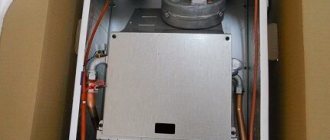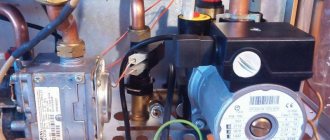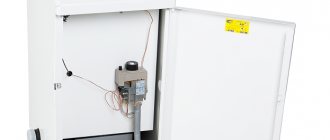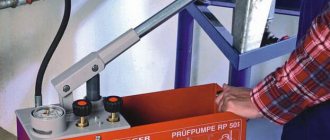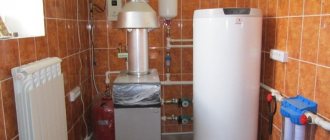My home is my fortress, and in a fortress everything should work like a clock. Agree, when returning from work, we dream of relaxing and enjoying the comfort, and not of repairing the faucet, boiler, or figuring out why the gas boiler is humming. However, it is extremely important to understand the causes of the problem when its first signs appear.
According to the rules for operating gas equipment, regular inspection and assessment of technical condition must be carried out by gas workers. But they cannot identify all impending problems in work, because are not required to visit clients daily. Therefore, it is very important to monitor the equipment yourself and know what to pay attention to.
In this article we will tell you what noise indicates when a gas boiler is operating, and why it whistles, hums, pops or clicks. Timely identification of the cause of sounds will help prevent breakdowns, extend the life of gas-consuming units, and make your life more comfortable and safe.
Causes of noise in heating equipment
The new gas boiler operates virtually silently. However, over time, the unit begins to make noise.
This is a sign of hardware failure:
- scale formation;
- the fan has failed;
- wear of device components;
- manufacturing defects;
- incorrect settings or installation of the boiler.
To understand why a gas boiler makes loud noise, you need to listen to the noise the equipment makes.
If the hum is heard directly from the boiler, then you should check the water level and add it if necessary. If noise is heard from radiators or piping, then air has entered the system and must be removed. Extraneous noise in the pump itself indicates a manufacturing defect.
Clicking sounds that occur at short intervals indicate problems with the fan. If the boiler hisses or whistles, it means that a lot of scale has accumulated in the device
If the circulation pump breaks down, this element often needs to be replaced. The gas supply to the system must be adjusted from time to time. High pressure is undesirable.
Problems with the exhaust fan
If extraneous noise occurs at intervals, you should check the fan. Its task is to systematize the operation of the smoke removal system, due to which combustion products are removed from the boiler with the intensity necessary to ensure the complete safety of others.
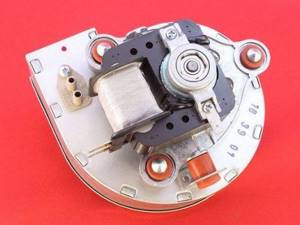
The fan blows through the system, clearing it of combustion residues, and also serves to remove smoke. The longer the boiler operates, the greater the fan wear
The main reason is age. Most likely, you just need to replace the fan with a new one. The second reason that leads to rapid wear of the cooler is its location above the burner at the top of the device.
Under constant exposure to high temperatures, the bearing lubricant quickly dries out, causing it to wear out. To fix the problem, you also need to replace the fan.
Another reason for the appearance of extraneous noise effects is that the part may be clogged with dust, to remove which you need to do the following:
- Inspect the fan. If necessary, it should be cleaned. The main blades are located inside the housing. You need to remove dirt and dust from them, and then lubricate the bearings.
- If the problem cannot be solved, replace the outdated valves with new ball valves.
- If the previous two steps did not bring results, reinstall the cooler.
It is better to entrust the replacement of parts to a gas boiler repairman from a service with which an agreement has been concluded for the maintenance of devices and the supply of blue fuel. Timely and competent replacement of worn parts will eliminate the need to buy a new unit.
Scale deposits on the walls of the heat exchanger
Thanks to the heat exchanger, heat is redirected from gas to water. If the water is hard, then scale may form in the heating system as it heats up. To remove mineral deposits deposited on the walls, it is recommended to regularly chemically flush the heating system and clean the heat exchanger.
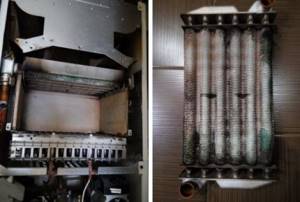
A household chemical for cleaning the heat exchanger can be purchased at the store. Craftsmen often use 4% vinegar for these purposes. After cleaning, parts should be rinsed with water.
This problem is noticeable after 15-20 minutes from the moment the gas boiler is started. The reason for the sound is the narrowing of the passage for water. As a result, steam and small bubbles are formed. Scale reduces the efficiency of equipment, as well as its heat transfer and wear resistance.
You can descale the unit using chemicals containing soda and similar substances. You can do this yourself. To do this, remove the heat exchanger, remove the casing and unfasten all connected pipes. A special chemical solution must be poured into the device for 2-5 hours.
Lack of water in the heating system
If there is not enough water flowing through the heating system, the boiler begins to make noise due to overheating. This is because air pockets form inside, interfering with the normal circulation of fluid in the system.
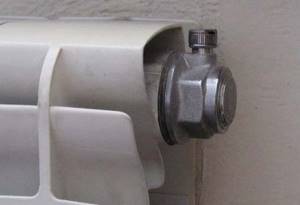
Airing the system leads to incorrect operation of the boiler. If there is not enough water in the pipe section, an air lock will form. At the same time, the heating device partially cools down, and water cannot circulate normally in the system, so it overheats by the burner. At the same time, a dull whistle or howl is heard
Airing leads to the following problems:
- the circulation of water in the coolant decreases or stops;
- The boiler automatically turns off due to overheating of the coolant.
Reasons why air ends up in the heating system:
- violation of sealing during repair work;
- violation of the integrity of the system;
- drainage of water from the DHW circuit.
To make the device work, you need to adjust the thermostat. You also need to make sure that the thermostat is installed correctly, add water, and adjust its supply and circulation.
The Mayevsky valve, which is mounted at the end of the radiator, will help get rid of air in the system. It has a fitting that, when opened, allows access to the inside of the battery. The faucet is most often installed at the top of the device, where warm air accumulates.
You can also use an air separator. The device collects air that collects into bubbles as water flows along the circuit. When excess air has been completely removed from the pipes, replenish the coolant through the make-up tap and make sure that the boiler operates without any extraneous sounds.
Arranging a perfectly sealed heating system will prevent the accumulation of air in the coolant. This is troublesome and expensive, but it will eliminate the occurrence of extraneous noise in the gas boiler.
Consequences of low pressure
Reasons why pressure in the system may decrease:
- water leak;
- breakdown of the boiler expansion tank;
- long interruption in electricity supply;
- Incorrect setting of the gas boiler.
If the pressure in the system drops, the boiler begins to make loud noises. Your task is to first check if there is a leak in the heating circuit. A simple napkin will help you with this; use it to wipe all joints and joints. Once the source of the leak is discovered, it must be eliminated.
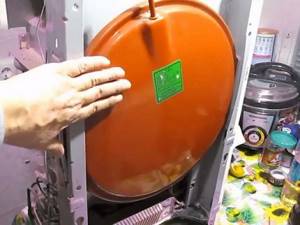
If the pressure in the system drops, the boiler stops working because it is blocked automatically. Lack of water in the heating circuit leads to overheating, it is detected by sensors, after which the boiler turns off automatically
The cause of pressure changes may be cracks in the expansion tank or heat exchanger. To identify their location, all water should be removed from the system, and then air should be pumped into it using a compressor. In places where microcracks form, air will leak out with a characteristic whistle. The appearance of microcracks indicates wear and the need for complete replacement.
This occurs as a result of frequent flushing of the system with chemical reagents, due to poor quality metal, a sharp increase in pressure in the line, and water hammer. If you can remove and repair the heat exchanger yourself, then you can try soldering the resulting microcracks.
To prevent such problems, it is recommended to regularly inspect the boiler, as well as install auxiliary equipment that will allow you to control the pressure by displaying the value on the screen. Standard pressure indicators are 1.5-2 atmospheres.
Incorrect unit setting
Incorrect adjustment or installation of equipment can also cause a valve or bypass to whine. Extraneous noise may occur as a result of improper load redistribution.
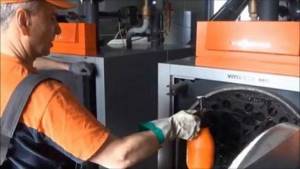
If the operating power of the unit exceeds the permissible values, vibration occurs as a result of excess pressure and the pump begins to rattle
If the sound of metal hitting metal occurs during heating or cooling, uncompensated heat expansion occurs in the device. The reason lies in incorrectly installed radiator mounting brackets.
If you don’t know why your gas boiler is constantly whistling, you should first check the settings. The rules and sequence of actions when setting up a gas boiler can be found in the technical documentation for the unit; operating parameters can be found on the nameplate attached to the equipment body.
The heat exchanger is clogged
The heating system receives water that is not pre-filtered or purified. As a result, sediment forms when the water is heated. After some time, scale forms on the parts, and then the quality of the device’s operation decreases. As a result, noise may occur during operation. The most important part of the heating system is the heat exchanger. During gas combustion, the heat exchanger heats up and transfers heat to the heat carrier. But the whistle may not appear immediately. It occurs some time after the start of use. Any lime deposits negatively affect the operation of the boiler and reduce its service life.
If a large amount of scale has formed and heavy deposits have appeared, then in addition to whistling, you can also hear small tapping sounds. To get rid of extraneous knocking noises that appeared as a result of scale formation, you need to clean the heating system. Any household chemical store sells special chemicals. They can be used to clean your heating system.
Noise diagnostics
The operation of a boiler with a water heating circuit is often accompanied by noise. It not only brings significant discomfort, but can also be potentially dangerous for everyone in the household. Therefore, it is not worth leaving this problem without a solution.
Before identifying the cause of the deficiency, the nature of the extraneous sounds should be determined. This will help in diagnosis and increase the chances of successfully fixing the problem.
The most common defects of boilers in a fireplace include:
- quiet knocking in the boiler;
- a crackling sound that occurs when the heating system is turned on;
- regular appearance of hum;
- vibration;
- periodically repeating clicks.
All of these signs indicate that the problem needs to be corrected. If you ignore them, the situation may be resolved by a complete breakdown of the entire heating system.
Expert opinion
Filimonov Sergey Vinokurovich
Heating equipment repairman
A loud bang that occurs when igniting may indicate gas accumulation. To avoid undesirable consequences, it is necessary to evaluate the condition of the electrodes, burner and connections.
Fan fault
It is difficult to imagine the operation of a heating system without a fan. After all, it performs an important function. Thanks to it, combustion products are removed from the boiler, and the system is blown to remove smoke. If the fan does not work properly, various whistles and noises may appear.
In newer heating boilers this rarely happens, but if the equipment has been in use for more than a year, then this reason is quite common. If there is no lubrication or the fan is located above the burner, it will wear out quickly.
In order to replace the fan, you can call a qualified technician who will quickly perform the replacement. And you won’t have to purchase a new heating boiler.
But various noises may appear due to a decrease in pressure or a lack of coolant in the heating system. If the heating system does not have the required amount of coolant, the gas boiler will begin to overheat, and as a result, various sounds will appear.
In order to eliminate extraneous sounds in a gas boiler, you first need to determine the cause of the noise. If you do not have experience in repairing heating devices, then finding the cause on your own will be quite difficult. Only a specialist can determine by the sound what kind of breakdown has occurred in the boiler. If you decide to look for the cause on your own, you risk making the situation even worse.
Why does the gas boiler hum and/or whistle?
There are times when the boiler interferes with the noise it makes. When the burner operates, it makes a noise similar to that of a jet plane. The gas boiler is noisy and can be heard throughout the house. It naturally interferes with sleep, especially when it turns on after a pause. How to reduce the noise made by a gas boiler?
Usually, it is not the boiler or the fan installed in it that makes noise, but not the correct installation of the chimney. To make the boiler start to make a noisy sound, you just need to narrow the chimney a little, and you will get a sound like at the airport. The solution is to change or expand the chimney.
There are very frequent cases when gas equipment with pressurized burners begins to hum. The fact is that fan units are equipped with a stabilization system aimed at regulating the gas pressure supplied to the combustion chamber. When operating, such a boiler hums like a vacuum cleaner. To reduce unpleasant humming to a minimum, it is better to build the boiler room building away from a residential building and provide good sound insulation for it.
The boiler may begin to hum due to a thick layer of deposits on the inside of the heat exchanger tube. The boiler begins to boil - it makes a sound like the sound of water in a boiling kettle. The primary heat exchanger is clogged. You can check this in the following way: set the boiler to the maximum temperature and close the return or supply valve so that there is minimal water flow. When the temperature reaches about 80 degrees, the hum increases. The only way to solve the problem is to clean the heat exchanger.
Shock-absorbing lining - what is it?
The shock-absorbing lining is a rubber sheet 10-12 mm thick or rubber washers of the same thickness. To reduce noise, all connections must be sealed and rigid, the chimney must be additionally insulated with thermal insulation (basalt mineral wool, etc.)
It happens that when you press the ignition button, a whistle is heard from the pilot burner nozzle. If air appears in the gas pipeline or gas fittings, it is necessary to unscrew the nut at the junction of the gas tube to the gas fittings, press the ignition button, having first loosened the pipe, bleed out the air until the smell of gas appears. Tighten the nut.
If there is a flame separation, the pilot burner gas pressure should be adjusted using the adjusting screw. There are times when the wrong nozzle is installed, then it just needs to be replaced. This situation occurs in domestic units. The injector may also have a manufacturing defect, expressed in the absence of a chamfer along the edges of the holes. When switching to high intensity mode, the gas flow escapes and the boiler begins to whistle. The only solution in this case is to replace the nozzle.
We should not forget that gas boilers are explosive, so to fix problems it is better to contact specialists by phone 8.
Typically, a correctly installed heating boiler does not produce much noise and is characterized by almost silent operation. It is the low noise level that is one of the quality indicators of manufacturers of such devices.
But it also happens that a silent boiler, after a certain period of time, begins to make an unpleasant and quite noticeable noise.
Why it occurs, how it can be eliminated - we will analyze it in detail in the material below.
The first thing you should understand is that any malfunctions in the heating system or heating boiler are best left in the hands of a specialist. At least he will quickly determine the cause of the malfunction and eliminate it.
The second, even more important aspect, is that the technician will do all the preventive and repair work in accordance with safety precautions, which is a reliable guarantee of the well-being and functioning of the device.
Types of noise in pipes
The noises that accompany the general heating start-up differ from emergency ones - they are intermittent and are accompanied by gurgling or gurgling. In bimetallic or aluminum batteries, a crackling or buzzing noise may be heard - this is also normal.
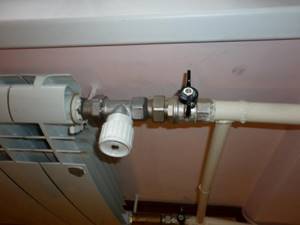
It is clear that prolonged noise is unpleasant, so it is necessary to prevent the situation in a timely manner.
The knocking and hum that occurs in the room with increasing force give reason to be wary and take drastic measures:
- Check heating devices and temperature conditions in the circuit. If a pump is installed, then its operation.
- Pay attention to the valves - if they break, a characteristic whistle appears. Sometimes a small adjustment is all it takes to get the equipment working.
- Having discovered visible problems, you need to stop the coolant and turn off the heating devices. Having assessed the breakdown, proceed to eliminate the accident yourself or invite a specialist.
These are primary measures that can prevent the development of major destruction.
Knocking in boilers and pumps
Boiler equipment used to equip heating systems can operate on various types of gaseous, liquid or solid fuel, or also on electricity. However, the operation of boilers of any type may be accompanied by certain side processes, which often affect the heating system and can cause noise in it.
In particular, wood or coal solid fuel can lead to clogging of the chimney with a decrease in draft force. The operation of boiler houses using liquid diesel fuel may be accompanied by incomplete combustion and accumulation of soot. All this often leads to noise and humming in heating communications, and requires measures to eliminate these problems.
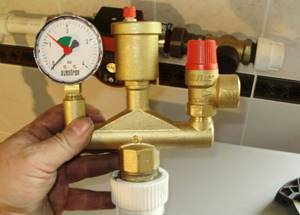
Noise may also appear due to malfunctions of pumps, valves or other devices and mechanisms located in the boiler room or basement. The solution to the problem in such situations is to repair faulty elements or replace them.
In general, any specific situation with the occurrence of noise in the heating system requires an individual approach, and there cannot be universal methods here. In some cases, identifying and eliminating faults on your own can be very difficult, and in this situation, the only way out of the situation is to contact qualified specialists.
Scale formation
A high salt content in water leads to scale deposits on the walls of the device. When heated, the salts will make themselves known by hissing. Because of this, the device heats up much more slowly. The radiator needs to be cleaned once a year. To do this, you will need a reagent, a special pump through which the reagent is poured into the device and rinses it from the inside.
Scale in the boiler - how to deal with it
In radiators, water does not move as quickly as in pipes, and the sedimentation of suspended matter is many times higher. Regular cleaning of radiators is necessary. You can flush the entire system at once or separately the radiators using a compressor unit. To flush, the radiator is connected to the compressor, and dirt is cleaned from it with water pressure.
Sometimes it is enough to simply flush the system with strong water pressure. Chemical reagents are used in cases where the situation with scale deposits is extremely advanced.
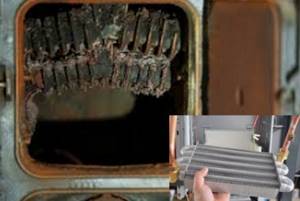
Scale formation deforms the device
Under the influence of chemicals, cracks may form in radiators that were clogged with salts. In order to prevent an emergency, before starting the system, all equipment must be checked for readiness for operation.
Infrared heating panels
Scale on boiler parts
Due to the fact that the water is not filtered before it hits the heating elements (read about choosing a filter for heating in a separate article), therefore sediment often remains on the internal surfaces of the gas boiler. Parts gradually lose their functionality. The problems start with the heat exchange elements. Further, sediment forms on the walls of radiators and pipes, this reduces the space through which water should flow. Getting rid of scale is quite simple; just open the gas boiler and clean it using special means. In this case, only the wear resistance of the equipment itself suffers. To avoid such problems in the future, it is enough to carry out periodic preventative cleaning.
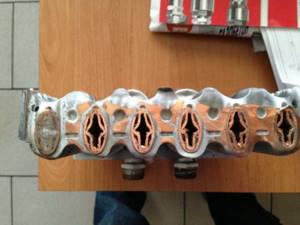
Causes of clicking noises
Below are the main and most common sparks experienced by housewives:
- Lime formation.
- The thermal balance inside the boiler is disrupted.
- The appearance of various damage to one or more elements of the entire system.
As for the rest, these are variations of the main ones.
IMPORTANT. Of course, if you are unsure of the correct detection of the source of the defect, it is advisable to contact a special service. Qualified specialists will be able not only to make a diagnosis in a timely manner, but also to eliminate it themselves.
Safety
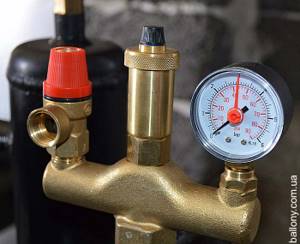
The following elements are responsible for the safe operation of the equipment:
- The coolant pressure gauge allows you to visually monitor the pressure in the system;
- The safety valve is activated when the permissible coolant pressure is exceeded;
- The air vent removes air from the heating system;
- The expansion tank allows the coolant to expand freely when heated without harm to the equipment;
- The coolant drain is made in the form of a tap and is necessary when servicing the boiler;
- The thermostat turns off the burner when the critical coolant temperature is reached;
- The temperature sensor works in tandem with the gas valve and is a guide for opening or closing the valve to maintain the set temperature in the boiler;
- The pressure switch ensures safe startup of the boiler at a system pressure of at least 0.5 Bar. When the pressure drops, the burner, pump and fan are switched off.
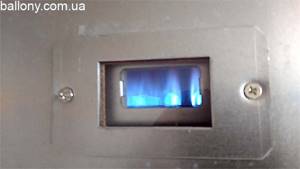
Thus, when the gas boiler is turned on, the first to be turned on are the elements of the safety system, which determine the serviceability of each component of the boiler equipment, after which it becomes possible to start the pump, fan and ignite the flame. If a problem is detected, the electronics will display the corresponding error code and will not give permission to start. Now we can analyze in detail the causes of extraneous noise in a gas boiler.
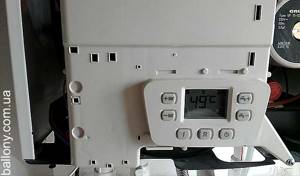
Water or antifreeze in the system is too cold
Why the water does not heat up may indicate a number of problems:
- If temperature sensors become unusable, they need to be replaced;
- If the gas valve settings are incorrect, the problem can be resolved by optimizing the valves;
- If scale has formed, the problem can be eliminated by washing the heat exchanger with a special solution;
Attention:
double-circuit gas boilers may not heat water well due to a faulty three-way valve.
How to prevent noise
To avoid the appearance of extraneous sounds during the operation of the fireplace, it is necessary to ensure timely maintenance of heating equipment. It includes lubricating parts, removing carbon deposits and dust, cleaning components and monitoring water levels. It is equally important to control the gas supply so as not to provoke an increase in pressure.
If you do not control the water level in the pipes, noise caused by water hammer may appear. It is caused by the force of inertia, due to which the liquid cannot instantly stop in the pipes.
What can cause clicking noises?
If the gas boiler clicks, you need to try to find the reason. If the equipment is used incorrectly, it becomes dangerous. Therefore, if extraneous sounds appear, it is necessary to carry out diagnostics, identify the source of the sound and eliminate the defect yourself or with the help of a specialist.
Burner installed incorrectly
If the burner is ringing, the reason may be hidden in incorrect installation.
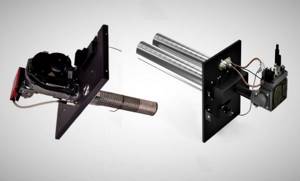
To ensure that the part is in good condition, it is recommended to check the pressure level of the gas exiting the burner.
You can find out the required indicators in the instructions for the device. If they do not meet the standards, the burner must be adjusted.
The appliance is noisy when heating water
Noise may appear when the water is heating up. This situation can be caused by incorrect installation or configuration of equipment. Therefore, you should check whether the device’s performance meets the standards specified in the instructions for the device.
Worn parts can lead to these problems when heated. Then it is necessary to replace the failed elements. Sometimes when water is heated, noise occurs due to high oxygen content. Because of this, as the temperature rises and the liquid heats up, bubbles begin to appear. Which leads to the appearance of various unusual sounds and vibrations of the boiler.
Excess pressure in the heating pump
A pump is necessary to create high pressure in the device. Therefore, if it fails, its operation must be adjusted. Increasing system pressure can cause a dangerous situation. If the water level drops, this will cause the equipment to overheat. The thermostat needs to be adjusted. In some situations, they add water to the device themselves.
If the boiler makes sounds similar to howling, the problem may be hidden in the settings of the gas valve.
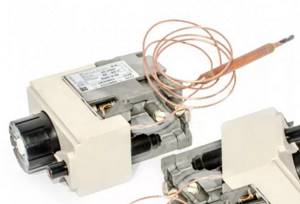
It is necessary to adjust it and check the jumpers. The increase in power is related to the gas meter. The valve may also wear out. This results in loud noises when the equipment operates. The valve needs to be changed immediately. If the noise does not decrease after this, then ball valves are installed in place of the valves. Additionally, it is recommended to equip the device with a rubber gasket. When these measures do not help, the cooler is replaced.
Prevention measures
If the boiler hums when starting up or turning on hot water, you must first make sure that there is a sufficient level of liquid in the system and, if necessary, top it up. If sounds are coming from radiators and pipelines, it means that air pockets have formed in them, which should be removed. If the pump knocks or whistles, it is most likely a manufacturing defect: you will have to install a new working unit.
An effective preventive measure is timely removal of scale from the heat exchanger. It is also important to monitor the gas supply so that the pressure does not build up too high.
Noises when heating water
When a gas boiler makes noise when heating water, the indirect reasons for this are as follows:
- Installation and connection errors.
- Incorrect setting.
- Wear of nodes.
If a gas boiler is very noisy, there are more clear reasons for this:
- The water in the pipes has a high concentration of oxygen. Therefore, when heated, bubbles form. Due to this effect, noise and vibrations of both the boiler and batteries increase.
- Air has accumulated in the system. When there is knocking and puffing in the device, you need to remove air from the pipes. Current radiators have taps. To eliminate air, you can simply unscrew them.
- If there are a lot of salts in the water, they are deposited in the heat exchanger, or rather on its walls. And when heated, the equipment hisses. At the same time, thermal output and heating dynamics also suffer. The first thing that makes noise is the heat exchanger in a gas boiler. It is necessary to clean the radiator at least once a year. For payday loans gallatin tn this task, a pump with a special reagent is used. Cleaning fluid flows into the device through the hoses.
- The fan began to work poorly. It is usually designed in modifications with an isolated combustion compartment and forced elimination of combustion products. It can spin very noisily and even whistle. Causes:
A) The bearings are located above the burner. And the grease dried out in them. These parts need to be disassembled and lubricated.
B). Blades are unbalanced. Contaminants have accumulated on them. They need to be cleaned and their rotation adjusted.
- There is too much pressure in the heating pump. In this situation, the gas boiler pump makes quite a noise. It needs to be configured again. Excessive pressure in the network can cause an emergency. To configure, you just need to switch the white lever on the terminal box.
The device may overheat due to a lack of water in the network. You need to study the thermostat parameters and set lower parameters. Pressure is also measured. If necessary, add coolant.
If your wall-mounted gas boiler makes a whine-like noise, the gas valve or bypass (jumper) may be set incorrectly.
When operating at significant power, rumbles also come from the gas meter.
Often a gas boiler makes a rattling noise due to a worn valve.
Answers to pressing questions
In what cases can air get into the heating system?
Air bubbles penetrate inside for a number of reasons, the most common of which include the damaged integrity of the ligaments, complete removal of water from the pipes and depressurization of equipment.
Why might the fan be faulty?
The main function of the fan is to remove combustion residues. As a result, it periodically becomes clogged with dust. Under the influence of high temperatures, its lubricant may dry out. All this together stimulates its wear and tear. Sometimes a faulty fan is a manufacturing defect.
What causes a whistle that sounds like a boiling kettle?
The most common reason for this phenomenon is the formation of scale with the subsequent narrowing of the passage of the device. In this case, whistling sounds appear approximately 20 minutes after starting the heating system.
Why do rattling sounds occur when the boiler is turned on?
Rattling occurs when the valve in the boiler wears out badly.
Why does the flame ignite jerkily when the boiler is turned on?
This happens when the injectors are severely clogged. The problem is solved by turning off the gas supply and then cleaning the cavities with a thin wire.
Regardless of the cause of the noise, the problem cannot be ignored. The sooner it is eliminated, the better.
When the boiler is turned on, a popping sound is heard
If, when you turn on the gas boiler, you hear extraneous noises: pops, clicks, knocks, you should immediately start looking for the problem.
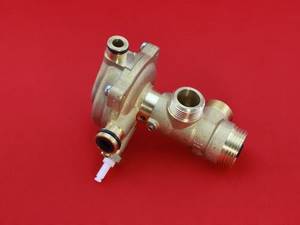
The three-way valve is the main component of a double-circuit gas boiler. Its task is to regulate the redistribution of flows when the hot water supply is turned on. If the cause of extraneous noise lies in the valve, it is faulty and the part needs to be replaced
What to do if the gas boiler slams sharply when turned on:
- Three-way valve malfunction. This device sends water in a small circle when drawing sanitary water from taps. If it clicks, it needs to be replaced.
- Prolonged spark ignition. When ignited, the resulting excess gas flares up and a characteristic pop is heard. In this case, it is recommended to check the igniter, burner, electrode, and all contacts.
- The chimney or filter is clogged. In this case, they need to be cleaned. The chimney is checked with a lit match. If the flame deviates, everything is fine; if there is no draft, cleaning is required.
- Installation error. If the equipment is installed incorrectly, but when heated, the metal is deformed and popping sounds are heard. The same sound occurs when it cools as the metal returns to its original position. When switching to hot water supply, the boiler hums. The problem is solved by reinstalling the gas boiler.
- The injectors are clogged. A thin wire is used to clean them. You must first turn off the gas.
If the boiler vibrates during operation, it is recommended to place a gasket under the body.
Murmuring of water in batteries and methods of elimination
Water in batteries can gurgle for various reasons. To determine, you need to know the features of radiators.
Leaky connections
Air bubbles create splashing and murmurs that frighten the owners of the house. The main reason for the appearance is the lack of tightness in threaded connections. The heating circuit almost always sucks air A kind owner knows this feature and monitors the condition of valves and pipe joints for integrity and tightness.
Photo 2. Leaky battery threaded connections create gurgling sounds, so you should always check the joints.
Bleeding air when unpleasant “symptoms” appear is a reliable way to avoid discomfort when operating water heating devices in a private home. If you have Mayevsky taps, you can quickly bleed air from a separate battery. The “culprit” is determined by palpation. The radiator in which air has accumulated loses temperature and freezes in the upper part.
Poor removal of air from the system before starting
Be sure to thoroughly bleed the heating circuit when putting it into operation. Heating branches extend from the boiler, each of which has a circulation pump installed. It is necessary to unscrew the screw on the front side of the pump . Then the water will begin to drain and the air will bleed out.
During the procedure, about ten liters of coolant are released. To ensure that the automation does not block the operation of the boiler by reacting to a sharp drop in pressure, the system is simultaneously recharged with an additional amount of liquid.
Error in installing the heating system
The heating circuit in a private house is a serious communications scheme. It is prohibited to install its elements without following strict rules.
Violations of the laws of hydrodynamics and heat transfer threaten serious troubles for residents of the entire house.
The materials used must meet standards, have good resistance to adverse conditions, and be used only for their intended purpose.
Attention! can install and commission the heating system .
Incorrect fitting size
The discrepancy between the dimensions of the connecting elements and the dimensions of the main pipe leads to constant noise and murmur. The internal diameter of the fittings changes the pressure of the coolant and the speed of its flow in the areas of its location. This provokes not only the appearance of sound, but also additional load on the pump. All parts of the contour are selected according to the same size.
Photo 3. Connecting fittings and circuit pipes must match in size and diameter.
Heat carrier saturation
A very common occurrence is the ingress of oxygen into the coolant. Because of this, various extraneous noises may appear. Oxygen enters an open heating system more often than a closed one. When oxygen enters the system, it heats up and is released in the form of small bubbles. This creates a certain sound. It is somewhat similar to the sound of a kettle boiling. But such a sound does not mean that there is any malfunction in the system. It’s just that such a sound leads to discomfort for residents. After all, everyone wants to relax in silence, and not listen to extraneous sounds of operating equipment.
If the whistle appears due to oxygen getting into the coolant, then this will not affect the operation of the heating system in any way. But all the same, such noise must be eliminated. Although such a sound will not cause any harm to the system, it still makes you worry and think about the appearance of various problems.
In order to avoid oxygen getting into the coolant, it is necessary to arrange a closed heating system. But this is not so easy to do and will also require a lot of investment. Let's consider several options for how to install a closed heating system:
- Replace the expansion tank with a membrane one;
- Install air vents on heating equipment;
- The automatic system must be designed to be sensitive to various weather conditions;
- Ensure automatic replenishment of the heating system.
- By performing these actions, you will ensure high-quality operation of the heating system, and the gas boiler will operate more efficiently.
What should you do if your gas boiler suddenly starts making noise?
Never try to fix boiler problems yourself. Any gas appliance in the home can be dangerous if you constantly interfere with its operation without professional skills.
Regardless of the reason, it is always a good idea to have a certified professional come to your home to thoroughly inspect your heating system. Troubleshooting by professional technicians from our company will help you save a lot of time, and the right approach to the matter will help you repair the boiler in the shortest possible time.
Cases for models of certain brands
First. Navien. If the error is not reflected on the device’s display, but the equipment is very humming and noisy, then you immediately need to quickly figure out why the Navien gas boiler is noisy?
- Blockages in the form of scale.
- Problems with the thermal fluid.
Actions:
- The device is disassembled.
- The heat exchanger is cleaned or replaced.
- The taps are checked for maximum openness.
- The water temperature decreases.
Second. Beret. Usually their devices have an atmospheric burner. Then the noise is very low. But if they increase, then in Beret units the reasons for this are most often:
- Poor heat transfer in the heat exchanger. This ends the use of DHW. Scale accumulates in the heat exchanger.
- Incorrectly selected pipes.
Third. Conord. These models most often make noise under increased loads, for example in cold weather. According to documents they are the same power limit, in practice they are lower. If the documentation indicates 13 mbar, then in reality it is 10 mbar. Therefore, there is no need to configure the financial assistance grants device to maximum.
Fourth. Baxi. Most often they make a lot of noise during the heating function, while during hot water supply the noise is weak. Actions: checking the bypass, cleaning and adjusting the valve. This work is usually carried out by service employees.
Fifth. AOGV. Their users often complain about whistling. Once ignited, it becomes stronger. After disconnecting it disappears. For example, if the AOGV-17.4 model whistles, the reasons for this are as follows:
- Scale accumulations.
- Clogged filter in the inlet section.
Sixth. Vaillant. Often these boilers hum after ignition and turning off the fire (the pump is on). Without the heating function there is no noise. Causes:
- Clogged strainer. The solution is cleaning.
- Problems with the valve on the bypass line. The solution is to adjust the valve.
Seventh. Ariston. The reasons for the noise in the boilers of this company lie in poor circulation of the coolant.
It is necessary to remove and thoroughly clean the heat exchanger and blow it with a compressor.
Eighth. Arderia. When an Arderia gas boiler makes noise, the reason usually lies in an incorrect pump setting. If it is not possible to set up the pump, it is replaced under warranty.
